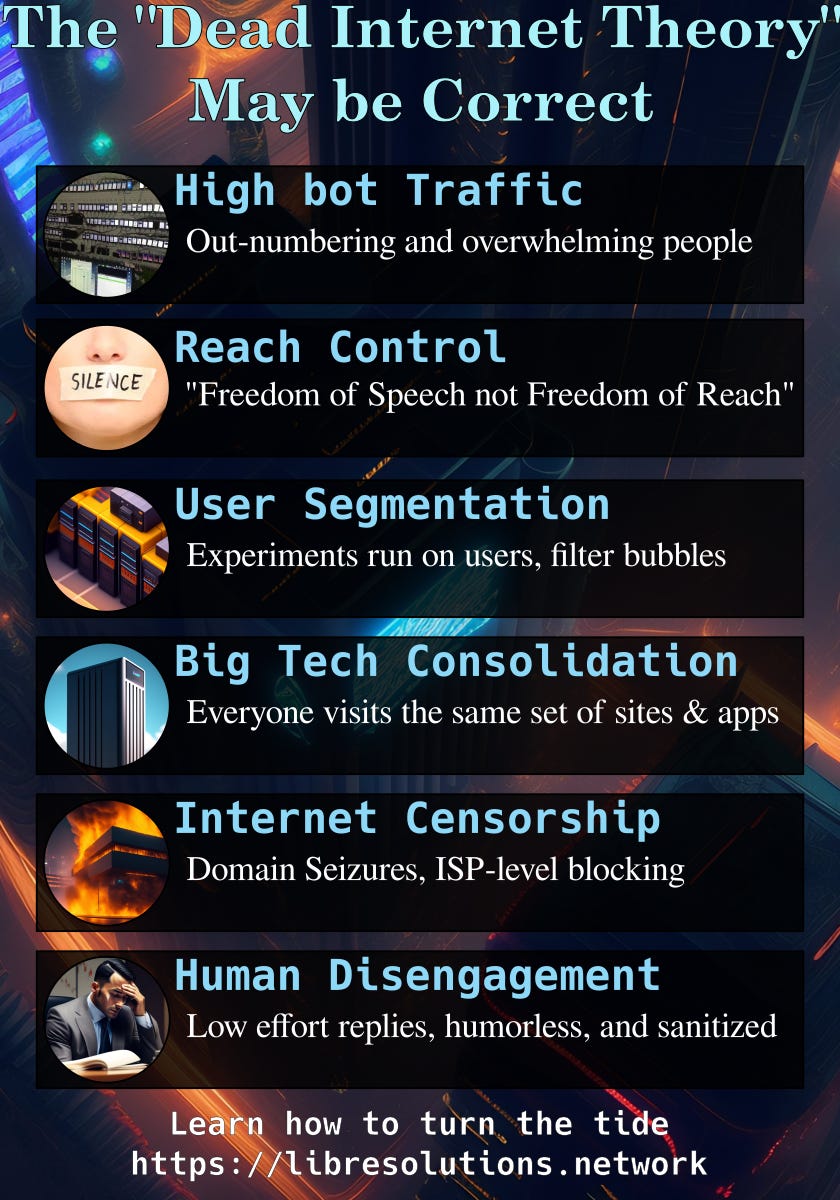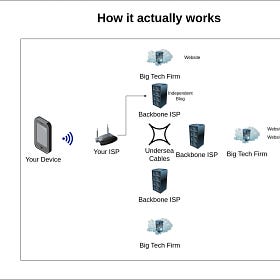Signs the 'Dead Internet Theory' is correct
What would it mean? What could be done about it?
The “Dead Internet” Theory
The basic concept of the dead internet theory is that a vast majority of the engagement online is artificial. And/or that every single human being on the internet isn’t actually connected to everyone else, but merely a chosen subset of people. One of the reasons this idea has gotten so much traction is that it eerily explains much of people’s online experience. While it’s possible that the feeling is just a figment of people’s nostalgia for exploring the web for the first time, there are actual trends and circumstances that support the idea.
The following is a couple of signs that definitely point to the idea that the Dead Internet Theory is likely, and/or at least possible. Afterwards, I’ll outline why this trend should be reversed, and how you can help.
If you like this idea, and want to discuss it with others, please share this image!
Immense Bot Traffic
An individual has to make the decision to choose to engage, bots are just full auto. As long as there’s currency, influence, or power to be gained from online participation, we can naturally assume the amount of bots online will steadily increase left unchecked. It’s worth noting that not all bot traffic is inherently malicious. Timely notifications, alerts and announcements are all things people may want to be provided automatically.
Examples:
Content Generation Tools:
By lowering the barrier to human-like participation, bots can get more human reactions, making them much more effective. Being able to put together sentences, or speak with a voice can drastically change the game for even other bots. In this competitive arms race, new tools have a profound impact for both people and bots alike.
Examples:
ChatGPT
Midjourney
Voice Cloning
Big Tech Consolidation
It’s a lot easier to manipulate people on a small set of online services, than over a wide ecosystem of independent online sites and communities. By herding the public onto only a few services, coordination also becomes much easier.
Examples
People only use a small set of apps
People can’t name more than 10 websites
People use search engines as a substitute for bookmarks or the address bar.
Search sucks now
Social Media: Learning the right lessons
What went wrong Corporate social media entities aren’t “the public square” and they aren’t a safe way to stay in touch with family and friends. While they may masquerade as such, they are the furthest…
Reach Control
With control over major platforms, it’s possible to counter breakthrough narratives before they gain momentum. Not only is this capability a highly profitable commodity, it’s also a highly effective mass mind control weapon. Screens are always going to be finite, and so are people’s attention span and lifespans. There will always be power in having direct control over prioritizing what others can see, even when you’re not outright gate-keeping information.
Examples:
Non-chronological “home” and “explore” feeds
Curated Trending
Facebook’s virality circuit breaker
Virtualized Segregation
One of the spookier claims associated with the Dead Internet Theory is that people are effectively segregated from other human beings and relegated to an algorithm ghetto. At first glance this seems like something that would be impossible to test for. It would be safe to assume that the state-of-the art surveillance and identification tools would be used to filter users. In addition to this, platforms could (directly or indirecly) share information with each other to coordinate the isolation beyond a single platform or medium.
How it works in practice: World of Warcraft sharding
When too many players are in an area, the game automatically creates a new “shard,” a copy of that area. Players entering the area will be placed on the new shard. The world appears identical from the player’s perspective, with minor differences:
Players can only see other players on the same shard.
Each shard has its own set of NPCs. As such, rare NPCs may respawn at different times on different shards.
Each shard has its own set of objects such as herbs and mining nodes.
Shards can be any geographic size but are usually limited to zones or smaller areas. The borders of a sharded area are invisible to players.
By design, players usually do not notice when the game moves them between shards, but players may notice NPCs momentarily disappear.
The simplest way to understand sharding is to think of it as people being split into multiple parallel dimensions. There are performance reasons to do this, but there are also other advantages to be gained from keeping people unable to coordinate. For systems simpler than online games (like social media) sharding doesn’t have to be absolute. Potentially, a system that does segregate people by default, could still make it possible to occasionally interact outside the bubbles to maintain the illusion of an open platform.
Other Examples
Personalized curation for geographical or political circumstances
Delaying feed updates or excessively rate-limiting access. (Sharding by time, rather than groups)
Internet Censorship & Shutdowns
The internet even in it’s current form can’t survive the current trend of escalating censorship and demands for top-down control. Left unabated, these forces will continue to transform the web into merely another highly advanced propaganda machine.
Cybergeddon: ISP-level de-platforming
It is important to remember that when it comes to free expression online, no corporation is coming to save you. For far too long, people have placed too much trust in corporate social media. They hav…
Human Disengagement
Ironically, as the digital world has encroached more and more into peoples lives, actual participation hasn’t kept pace. Commerce has greatly expanded online at the cost of centralizing control into a small set of payment providers. As the perceived value of engaging online drops, the easier it becomes for manipulators to take complete control.
Potential Examples:
None of your contacts participate online regularly
Being inundated with low-effort comments
Getting to know people online feels impossible
Content and seems entirely disconnected from real-life events
The tone of online spaces is vastly different
A complete lack of humor
So is the Dead Internet Theory actually true?
It’s not dead, but it’s dying.
The internet is less of a single body and more of an ecosystem. There has undeniably been immense disruption, habitat loss, and disasters. That isn’t to say that things can’t improve.
What you can do:
Are you ready to reclaim cyberspace? It’s a massive undertaking but many hands make light work. By taking control of your online presence, content, and attention you are already making a massive impact on how the future of the web. Instead of providing unpaid labor for top-down information management systems, you can genuinely contribute to a global and public information superhighway.
Maintain a non-commercial web space
I don’t believe it would take very many people at all taking an active interest in maintaining truly independent and personal (or anonymous) spaces online to have a massive impact on censorship resistance and meaningful interactions online.
The best website for a single person
Every single person should have their own website. I don’t just mean that we should all rush out to buy a fancy firstname.com domain. Instead, that it would benefit us all, if more people would take …
Use open protocols, instead of corporate platforms
Your own web space is just the beginning. There’s a world of opportunity to explore open protocols & systems for chat, audio/video calls, social media, collaboration, and many other things you can imagine.
Backcasting 2030
What is backcasting? Backcasting is when you imagine a scenario for an ideal future and try to trace a path to there from today. Instead of simply being comforted by a future world as we would like it…








I have been concerned about some of the notices I have been getting from substack, about what will appear on feeds and who we will see... feels like the start of a silo-ing process?
In ways we likely never expected it really is up to us. Technology has failed in this little bid to own what we are as humans.